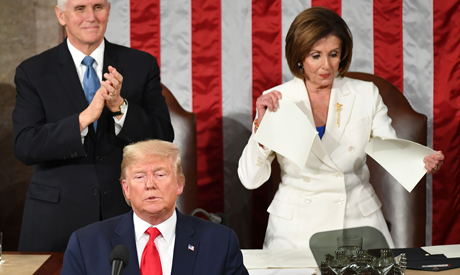
US Vice President Mike Pence claps as Pelosi appears to rip a copy of Trump’s speech after he delivered the State of the Union address in Washington, DC
(photo: AFP)
Before and after Donald Trump was elected to the White House in 2016, Democrats have battled him left, right and centre. They have lost every time, most recently the attempt to impeach him in Congress. The puzzling question is why are Democrats addicted to fighting losing battles? They fully understood how difficult it will be to remove Trump from office during hearings on the Muller investigation about Trump’s relations with Russia and the role of this relationship in his reaching the White House, and the top Democrat in Congress Nancy Pelosi hesitated for months before conceding to the left-wing camp in her party to pursue impeachment on what the pro-Democrat media labelled “Ukrainegate”.
The simple and likely explanation for the Democrats’ behaviour is that the conservative wing in the party, sometimes called “moderates”, was trying to maintain the cohesiveness of the party and prevent it from fragmenting. However, if that were true then why are the moderates the only ones trying to prevent divisions in the party; or in other words, why was it they who must concede to the radical or left wing of the party and not the opposite? Trump’s impeachment, which the Democrats on the left wanted at any price, was highly unlikely and many “conservative” or “moderate” Democrats worried that if their party continues to lose one battle after the next against Trump, this would empower him instead of isolate or weaken him in the upcoming presidential race.
The reality Democrats are trying to escape is that their party is leaning heavily towards the left since the emergence of a new generation of Democrats that played a prominent role in carrying Barack Obama to the White House in 2008 and 2012. It is the same generation that forced the party to embark on a long and arduous battle to choose a candidate to run against Trump in 2016. Bernie Sanders, who has socialist-leaning ideas and was supported by this generation, almost defeated the moderate candidate, Hillary Clinton, whose victory as the Democratic candidate was announced in the last round of the primaries. This generation adopts very diverse and sometimes contradictory values and has ideas and outlooks that are tainted with simplistic slogans, rushing to destroy any system they dislike, without thinking of alternatives that will fill the subsequent vacuum.
This generation also denies there are divisions within the party and believes society in the US is divided between two camps based on morality not politics. For example, Robert Reich, former labour secretary in Bill Clinton’s administration, wrote an article on the website The American Prospect on 16 July 2019 with the telling title: “America’s Real Divide Isn’t Left vs Right. It’s Democracy vs Oligarchy.” Reich denied any divisions within the Democratic Party and called for closing party ranks inside and outside the party against the populist right-wing represented by Trump and his supporters.
This is the traditional rhetoric of the left in the US whose ideas are embedded in the minds of a large segment of American youth in general, and especially Democrat youth. The success of the party’s left-wing in forcing Democrats to attempt to impeach Trump, despite skimpy evidence, is a sign of this current’s influence within the party and its steadfast doctrine to release its anger against a certain situation or system, no matter the consequences.
While preventing a split in the party may have been successful, as some Democrats claim, this has come at the cost of its image in the eyes of US public opinion. Trump and Republican supporters succeeded in portraying repeated attempts by Democrats to indict and impeach Trump as a personal vendetta, prioritising narrow partisan interests over the public interest. From the perspective of Democratic supporters, policies that the party’s left-wing are pushing, such as leniency on illegal immigration, expanding healthcare without thinking of the cost, and restricting the purchase and possession of personal firearms, are all policies opposed by Republicans and Trump.
These policies are mostly supported by Democratic voters, and the dominance of the left-wing camp within the Democratic Party — as clearly demonstrated by the attempt to impeach Trump — raises an alarm about the future of the party. The Democratic Party is already suffering because it has not yet decided on a strong candidate to run against Trump in the presidential race, and even worse, some party members are still adamant on continuing to battle Trump and ignore the Congress acquittal. They view him as guilty and therefore he should be slandered in the coming months, in the hope this will impact his chances of winning a second term in November.
Periodic opinion polls conducted by Reuters reveal that the impeachment trial did not impact Trump’s popularity among Americans, although it was broadcast live. Some even predict Democrats will also lose in the long-term, and they will not be able to truly contest the elections for the White House even beyond a second term for Trump.
Michael Kimmage, a history professor at the Catholic University of America, said as much on the website Politico on 5 February, when he was asked what he expects historians will write about the impeachment trial and this era 50 years from now. He responded: “I think they will say the following: The Trump era began with Trump’s election in 2016, hit a high point with his acquittal on impeachment in 2020 and ended with President Mike Pompeo’s 2028 loss to the young Midwestern Governor Tom Wilkinson.”
*A version of this article appears in print in the 13 February, 2020 edition of Al-Ahram Weekly.
Short link: